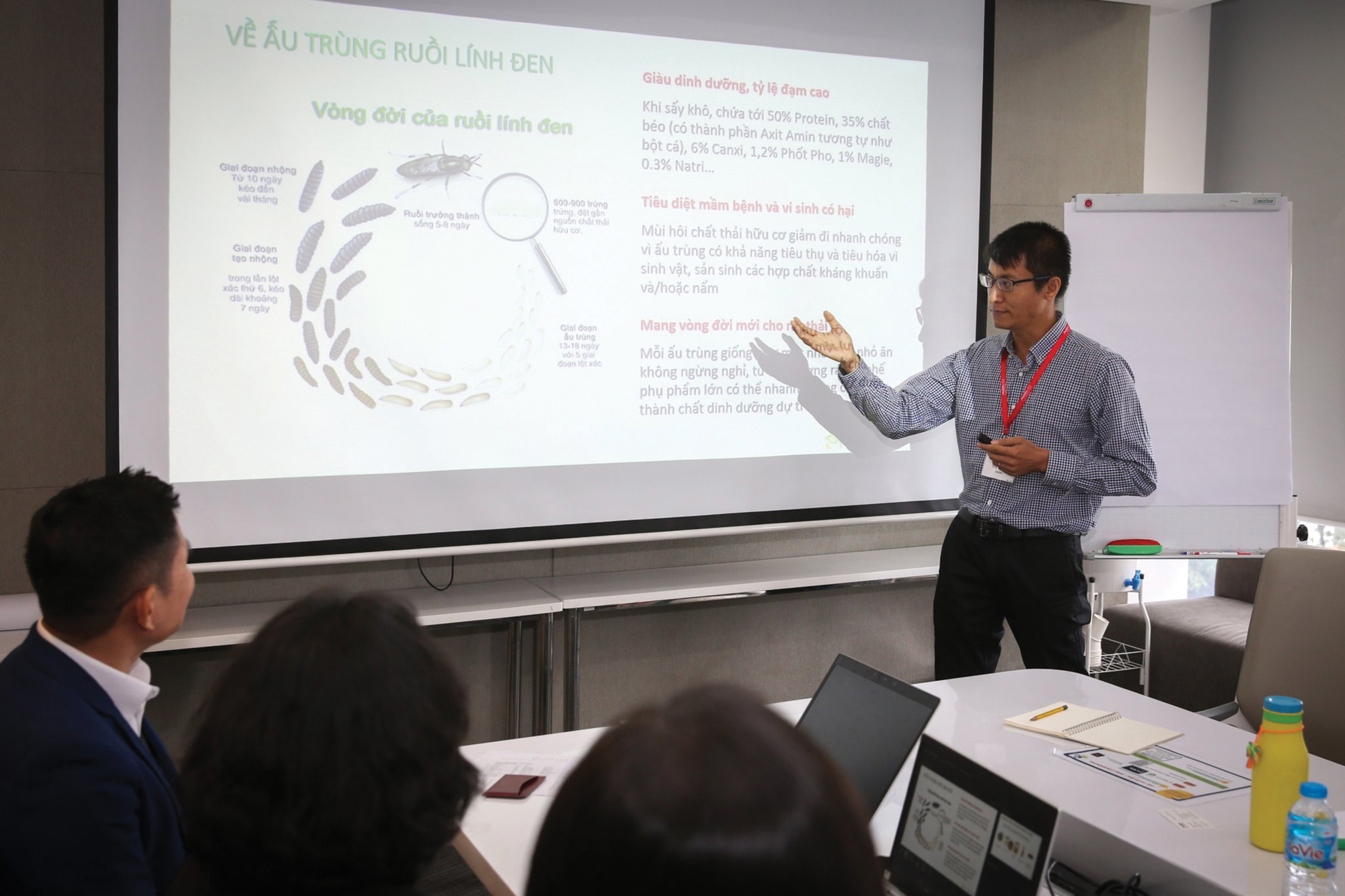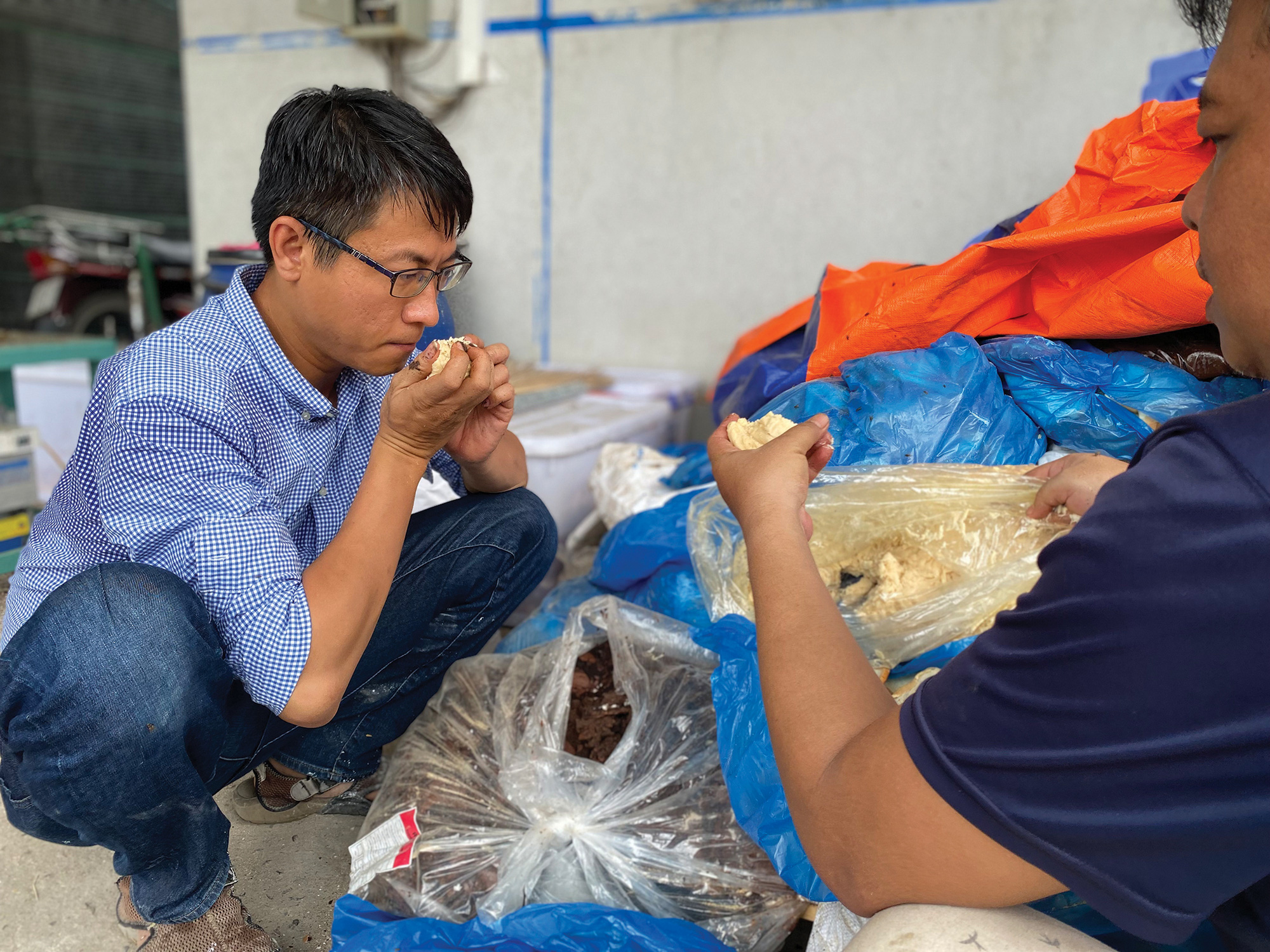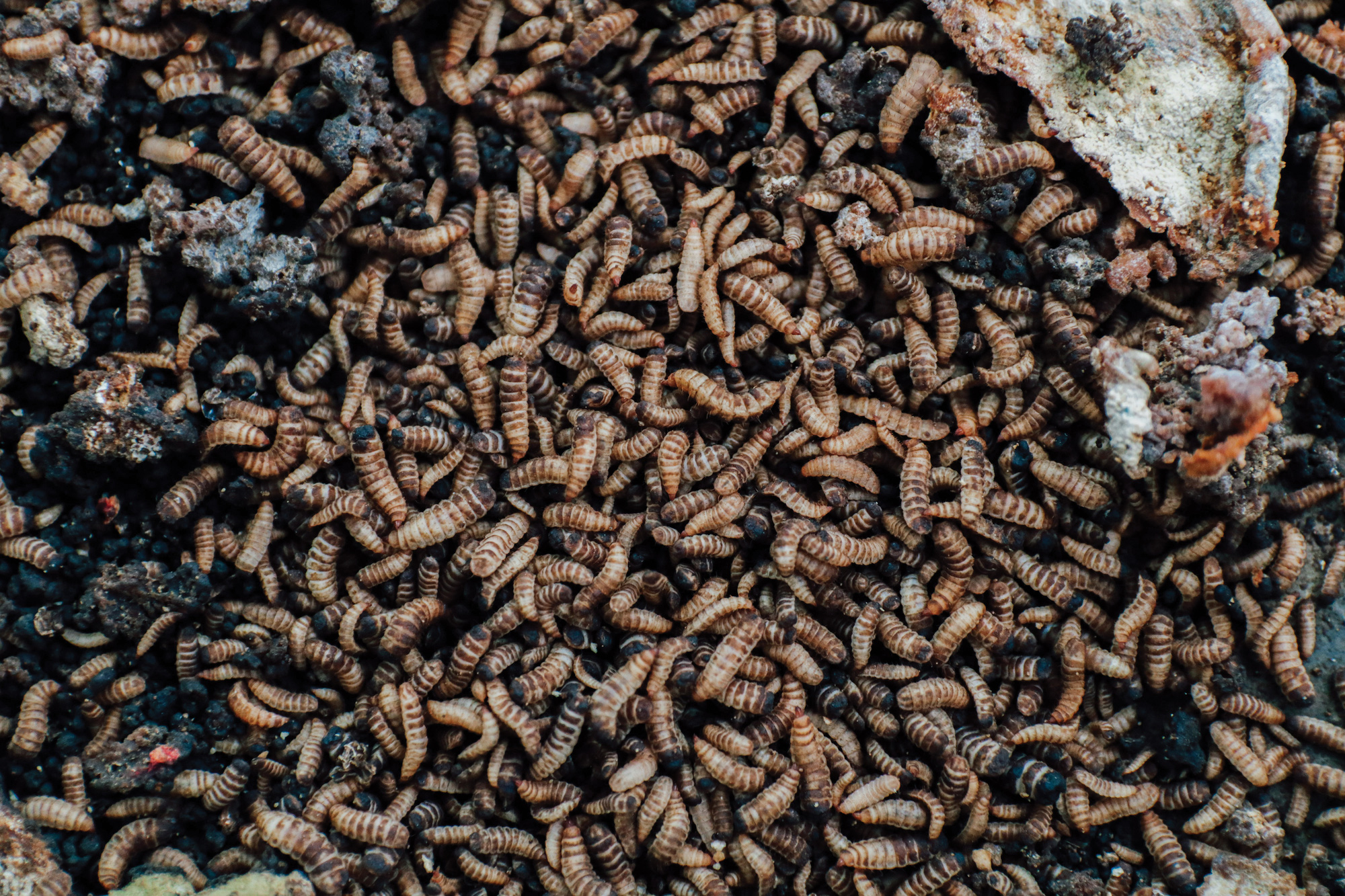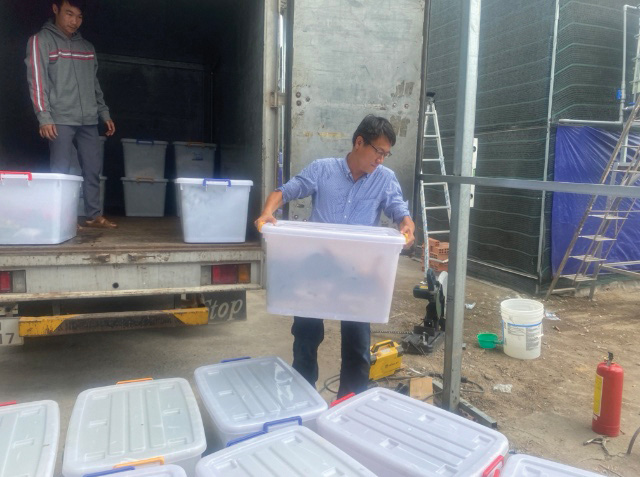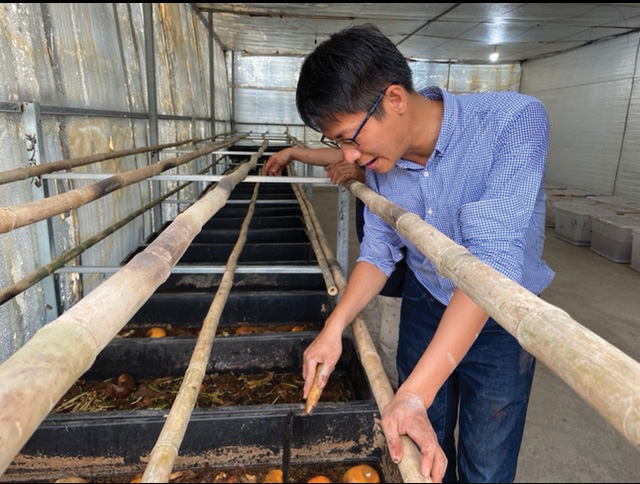The young man named 'Hanh Phuc,' meaning 'happiness', successfully earned a master's in public policy from Harvard University and returned to Vietnam for work, turning down job offers with good salaries in Singapore.
It takes about 90 minutes to drive from Ho Chi Minh City to Hanh Phuc's insect farm in Nhon Trach District, Dong Nai Province.
Although your correspondents had GPS maps, they got lost among rice paddies, canals, and winding, narrow roads under construction.
Turning waste into 'gold'
"I travel every day, so I have gotten used to it," said Huynh Hanh Phuc, whose name produces more than 28 million results from a Google search.
The young man led the way in front of the reporters on an old motorcycle and guided them to his 2,200-square-meter farm with 5,000 chickens.
Hanh Phuc, 36, starts his normal day at dawn. He leaves his house in Ho Chi Minh City and drives to his two farms in Nhon Trach or Vinh Cuu District, both located in Dong Nai.
"There, I assist my co-workers in feeding the chickens, observing and taking notes," he said.
"At 9:00 in the morning, I take care of various business matters such as reading documents, answering inquiries from partners, checking technical procedures carried out by staff, and traveling between the two farms."
"My day often ends at 0:00 or 2:00."
|
|
| Huynh Hanh Phuc checks the quality of waste before recycling it on his farm in Dong Nai Province, southern Vietnam. Photo: Tuoi Tre |
The chickens are raised in a large area where they can run freely. Working next to the birds all day, not far from their waste and fertilizer, one can notice a 'characteristic smell' when standing next to Hanh Phuc.
"I usually put out garbage and probiotics and sort out insect larvae directly with my hands," Hanh Phuc explained.
"Probiotics sometimes stain clothes and make their colors fade, and I cannot get rid of that smell despite washing them with soap several times.
"Once when I was dealing with duck waste on a big farm, the waste splashed out and covered both my head and my clothes.
"The first sentence my wife said to me when I entered the house that day was, 'Go take a shower right now, or I'll make you sleep on the floor tonight'."
Hanh Phuc farms with black soldier flies, which are seen by the world as an alternative source of protein for fish stocks that have been alarmingly overfished over time.
"Black soldier flies can process waste so quickly that they produce organic fertilizer in a very short time," Hanh Phuc said.
"Dead larvae are a good food source that can be mixed with the feed of chickens, pigs, and eels.
"Using this species of flies to recycle waste is an optimal model for the environment.
"The unpleasant smell of waste can also be minimized by insect larvae and probiotics."
|
|
| Larvae of black soldier flies hatched on Hanh Phuc's farms in Dong Nai Province, southern Vietnam. Photo: Tuoi Tre |
Recently, Hanh Phuc has launched a new project called Green Connect, which links the supply and demand of waste.
"We are building a system that transports and processes waste. For example, supermarkets are a huge source of waste nowadays, but farmers do not have access to this source to feed their herds," Hanh Phuc explained the ambitious plans he is pursuing.
"We will turn waste into a kind of resource and create a cycle of different phases, including materials for raising and producing food, which can be jokingly called 'putting waste on the table'."
The Green Connect project will be powered by waste and organic by-products from restaurants and supermarkets.
Their partners are guided on how to sort waste properly.
They dispose of packaging labels, nylon packaging, and rubber bands before they add the probiotics supplied by Green Connect.
In the next phase, the processed waste is packed in sealed containers and taken to the farms during the day.
Currently, Green Connect's two farms can process about 40 metric tons of waste per month.
|
|
| As a CEO, Hanh Phuc does not hesitate to help carry waste packages to his farms in Dong Nai Province, southern Vietnam. Photo: Tuoi Tre |
Enjoying every moment to the fullest
When Hanh Phuc returned to Vietnam from the U.S. in 2016 and launched his first project called Teach for Vietnam, he announced a desired mission in a Tuoi Tre report: "By 2050, all Vietnamese children, regardless of their family circumstances, should enjoy a comprehensive education system.
"Right now, Teach for Vietnam can work well, so I am transferring it to my staff and focusing on the Green Connect project."
"These two projects are actually closely linked," he added.
"Green Connect will create a new, sustainable, and more practical cultivation trend.
"In this way, the quality of life in the rural area will be improved and the dream of quality education for underprivileged children will be realized."
With a demanding Harvard degree in his pocket, the young man once decided to turn down a monthly salary offer of hundreds of millions of Vietnamese dong in Singapore to return to Vietnam and carry out his own small projects.
Hanh Phuc is sometimes asked whether or not he ever regretted that decision.
"I thought about it for a few seconds a few times and then found it interesting," he said.
"The experience has filled me with great happiness.
"While I work as a farmer during the day, I wear formal clothes with a tie and shoes in the evening when I meet and give speeches."
"Although I face so many obstacles, I have no doubt and do not lose hope because I am a pioneer and I am about to make a significant impact on the community and the environment," the young entrepreneur said confidently.
"The earnings are enough for my life and, more importantly, I have a chance to live a life of creating value for the community with enthusiasm."
Hanh Phuc cannot realize his dream without the help of his companions. This includes Huynh Phu Cuong, who is assisting Hanh Phuc with the Green Connect project.
"As a biochemist, I am particularly concerned about the many 'mountains' of waste dumps that exist while no one seems to care about their impact and how to deal with them," Cuong said.
Considering that chemical fertilizers are popular even though Vietnam is a country of livestock and cultivation, Cuong said it is necessary to use good fertilizers for healthy agricultural products.
"I had my own project before, but I faced too many challenges and felt alone," Cuong recalled.
"Then, when I met Hanh Phuc by chance and found that he had talent and shared my thoughts, I decided to work with him."
|
|
| Hanh Phuc checks the process of black soldier fly larvae hatching on his farms in Dong Nai Province, southern Vietnam. Photo: Tuoi Tre |
Happy chickens
When raising chickens as livestock, Hanh Phuc believed the birds need not only space to live, but also an environment large enough for them to roam as freely as they would in nature.
"That's why we chose large cages where the chickens can live comfortably," Hanh Phuc said.
He added that according to a recent decree by the European Commission, in 2023 all chicken eggs sold on the continent must meet the standard of having been produced by 'happy chickens.'
Raising 'happy chickens' or organic chickens is the way free-range birds are farmed with free access to nature, sunlight, and organic feed, and has become a popular trend in many developed countries in recent years.
Farming flocks of chickens this way is more expensive, which in turn leads to a higher price for eggs and chickens.
"Not everyone accepts a 30 percent higher price for this kind of chicken, but I am lucky to be supported by the happy chicken farming model," Hanh Phuc remarked.
Like us on Facebook or follow us on Twitter to get the latest news about Vietnam!



